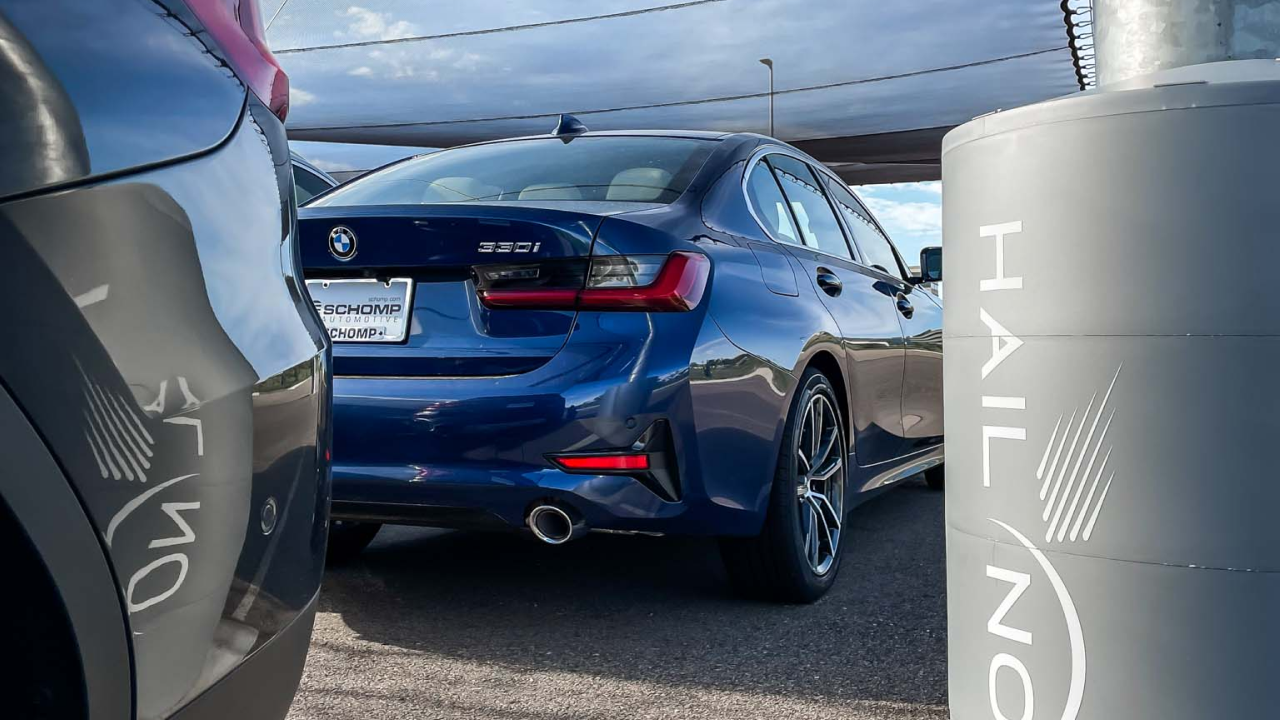Comparing Hail Netting to Other Hail Protection Systems: Which Solution Is Right for Your Business?
April 22, 2025
•
5
min read

Hailstorms can cause significant damage to vehicles, equipment, and buildings, costing businesses thousands—or even millions—in repairs and lost revenue. Protecting your business from hail damage requires a reliable solution, but with so many options available, how do you choose the best one?
In this article, we’ll compare hail netting with other popular hail protection systems, including tarps, covered parking structures, and fixed shelters, to help you make an informed decision and find the hail protection solution that is right for you.
Hail Netting Systems: Flexible and Cost-Effective Protection
Hail netting is a specialized protective mesh designed to absorb the impact of hailstones and prevent damage. It's particularly popular for businesses like car dealerships, auto plants, parking lots, and industrial enterprises.
Benefits of Hail Netting:
- Cost-effective: Lower initial investment compared to permanent structures.
- Scalable: Easily covers large areas, making it ideal for car lots or industrial facilities.
- Weather-resistant: Designed to withstand strong winds and heavy hailstorms.
- Minimal disruption: Quick installation with little impact on daily operations. Easy to remove.
Best For: Car dealerships, parking lots, auto plants, and businesses needing scalable hail protection.
>> Related Articles: What is Hail Netting? and How Our Hail Netting Is Engineered for Maximum Durability
Tarps and Temporary Covers: Inexpensive but Limited
Tarps and temporary covers are a common low-cost option for short-term hail protection. While they may work in a pinch, they come with significant limitations.
Pros:
- Affordable: Low upfront cost.
- Portable: Can be moved and reused.
Cons:
- Labor-intensive: Requires manual deployment and removal for each vehicle.
- Limited durability: Susceptible to tears and damage from strong winds.
- Not scalable: Inefficient for covering large areas.
Best For: Emergency use or small-scale protection for individual vehicles or equipment.
Covered Parking Structures: Permanent but Expensive
Covered parking structures provide permanent shelter from hail and other weather elements. These structures are typically made from steel or reinforced materials and offer robust protection.
Pros:
- Reliable protection: Shields vehicles from hail, rain, and sun damage.
- Low maintenance: Once installed, requires minimal upkeep.
Cons:
- High upfront cost: Significant investment compared to other solutions.
- Not flexible: Hard to expand or relocate.
- Long installation time: Requires extensive planning and construction.
Best For: Businesses with a high budget and fixed locations, such as corporate campuses or airports.
Fixed Roof Shelters: Durable but Impractical for Large Areas
Fixed roof shelters are similar to covered parking structures but are often more enclosed. While they offer excellent protection, they’re not always practical for large-scale applications.
Pros:
- Strong protection: Fully shields vehicles and equipment from hail.
- All-weather coverage: Protects against hail, rain, and UV damage.
Cons:
- Expensive and permanent: Not suitable for businesses with evolving needs.
- Limited scalability: Difficult to expand or relocate.
Best For: Warehouses and facilities that require comprehensive weather protection for high-value equipment.
The Case for Hail Netting: Why It’s a Superior Choice for Many Businesses
When considering all options, hail netting stands out for its balance of cost, flexibility, and effectiveness. Unlike permanent structures, it offers scalable protection without the long-term commitment or high costs.
Why Businesses Choose Hail Netting:
- Cost savings: Lower installation and maintenance costs compared to covered parking or fixed shelters.
- Customizable: Can be designed to fit unique business needs, whether protecting a small fleet or an expansive lot.
- Eco-friendly: Reduces material usage compared to permanent steel or concrete structures.
Hail Protection ROI: Many businesses find that hail netting offers a higher return on investment by preventing expensive damage and lowering hail insurance premiums, while keeping installation costs manageable.
Comparison Table: Hail Protection Systems
How to Use This Table:
- If you’re looking for flexible and cost-effective protection, hail netting is your best option.
- If permanent, high-end protection is a priority, consider covered parking structures or fixed roof shelters
- For temporary or emergency solutions, tarps may suffice, but they’re not ideal for long-term use.
Choosing the Right Hail Protection for Your Business
When selecting a hail protection system, consider your business’s specific needs, budget, and long-term plans.
- For large, scalable protection: Hail netting is the most flexible and cost-effective option.
- For permanent, high-budget solutions: Covered parking structures or fixed shelters offer reliable protection but come with high costs.
- For short-term or emergency use: Tarps and temporary covers may be sufficient, though they’re not practical for long-term business protection.
Ultimately, hail netting strikes the perfect balance for many commercial applications, offering reliable protection without breaking the bank. If you’re ready to explore how hail netting can protect your business, contact us today for a free hail netting consultation and quote.